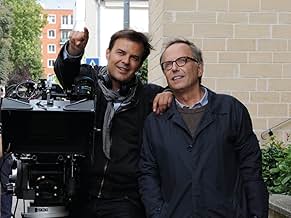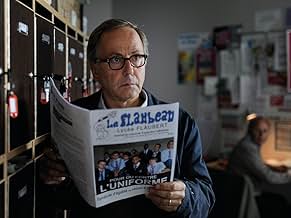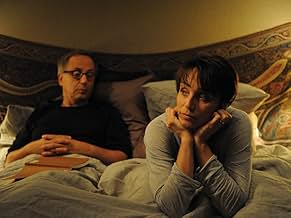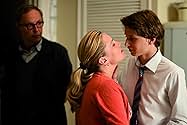IMDb-BEWERTUNG
7,3/10
35.430
IHRE BEWERTUNG
Ein Französischlehrer an einer Highschool wird in die zunehmend transgressive Geschichte eines frühreifen Schülers über seine Beziehung zur Familie eines Freundes hineingezogen.Ein Französischlehrer an einer Highschool wird in die zunehmend transgressive Geschichte eines frühreifen Schülers über seine Beziehung zur Familie eines Freundes hineingezogen.Ein Französischlehrer an einer Highschool wird in die zunehmend transgressive Geschichte eines frühreifen Schülers über seine Beziehung zur Familie eines Freundes hineingezogen.
- Regie
- Drehbuch
- Hauptbesetzung
- Auszeichnungen
- 10 Gewinne & 23 Nominierungen insgesamt
Jana Bittnerová
- La doublure de la jumelle
- (as Jana Bittnerova)
Empfohlene Bewertungen
Often funny, sometimes disturbing and sensual, the movie can be enjoyed at face value, but the heart of the movie lies underneath that appealing veneer, it's about creation and the required necessity to live your life fully to feed it. The budding writer enters the lives of a family, the same way a writer should embrace life itself, with a healthy dose of curiosity and nerve, precisely what his teacher is lacking. Add to that a fascinating and intricate observation of the blurring of lines separating reality from fiction in the feverish midst of artistic creation. Deep stuff, but all wrapped up in a neat bundle, Ozon making sure to leave almost no one on the side of the road, so to speak. So in conclusion it's smart and yet playful, intellectual but never pretentious. Well, in other words, it's a very good movie about potentially boring subjects. Highly recommended in those times of idiocracy!
When you say commercial movies like Looper are well written (because for their genre, they are), and then watch something like Dans la Maison (In The House), writing goes up to a new level. François Ozon, the director, had already impressed in 2003 with Swimming Pool, but In The House is probably his best film to date. It tells the story of a student that begins writing essays for his french teacher about one of his classmates' family, while he enters their house and makes himself a close friend. Into The House feels like reading a good mystery book while watching someone else interpret it, being that "someone else" your own self. In a very subtle way, Dans La Maison makes you addicted to its story, with a very traditional but poetic and beautiful directing, real life characters, and mesmerizing acting from Fabrice Luchini and Kristin Scott Thomas, bringing the mind of a 16 year old student to this amazing parallel reality. Visit the fading cam blog for more!
Francois Ozon is the director of this provocative and unusual film that takes the viewer inside the minds of the characters. It is not a traditional movie with a beginning and an end but a study of a period in the lives of different people. In this movie, a high school student named Claude catches the attention of his teacher named Germain, through an essay that explores the family of another student, named Raffa. Claude has begun to tutor Raffa in mathematics. At first the teacher, as the student's mentor, is hesitant about the breach of privacy with this series of essays but succumbs to the the temptation to become a voyeur. Each essay ends with the notation...To Be Continued. Both student and teacher are seen as outsiders in their own worlds and are strangely attracted to the family. The student gently mocks the family he is observing as dull and middle class. The teacher can understand this estrangement from their world because Claude is from a different world and the teacher himself is something of an outsider in his own world. He encourages the boy to continue his writing because he feels the boy has potential as a writer. As the movie goes along, we see the family of Raffa behaving as many other families pursuing money and status. The boy and his father are both named Raffa so they become the Raffas (plural). The student has a romantic interest in the mother, who seems to be the real reason he wants to explore the home. The desire for sexual encounters is present throughout the movie and seems to come out in a few surprising and light hearted episodes. We also see how Raffa and Claude interact with their teacher and the other students and their own families. The wives of Germain the teacher and Raffa Sr. are also interesting with one a traditional woman handling the domestic lives of the two Raffas. Meanwhile, Germain's wife manages an art gallery for two wealthy sisters, who she is trying to keep happy by making the gallery profitable. The movie is an interesting view of modern angst with the pressures to conform competing with the desire to be independent and on occasion, straying from the accepted standards. All in all, it is a provocative look at the different lives of people who interact and occasionally come into conflict. At the end, we see the message: to be continued.
For his thirteenth feature film, French New Wave director Francois Ozon has outdone all acclaim given to his 2002 remake of "8 Women" with a mischievous and dysfunctional tale, of what can be perceived as
coming-of-age.
A black comedy conflated with so much grandeur from literary greats to post-modern poioumena, you cannot help but wave the white flag and just go along in service of jest and sheer curiosity.
Adapted from a brilliant play written by Juan Mayorgo, this film is a meta-narrative centered on Claude Garcia (Ernst Umhauer) -- a sixteen year old loner who intrudes upon the home life of fellow student Rapha Jr., and writes about it. What begins as a one-off weekend assignment for literature class, escalates with great passion and frequency when Claude's teacher, Germaine (Fabrice Luchini) detects flashes of talent and decides to groom the teenager.
Here, Ozon proposes a three-fold narrative weaving through the surface of three realities -- Germaine's growing obsession with Claude's story imitates the viewers' relationship with Ozon's film (and perhaps soap opera addiction), and Claude as a self-conscious narrator of the events occurring inside Rapha's house.
When the film begins, Claude is unhappy with a lonely life and clearly needs to distract himself with wholesome family warmth. Having witnessed Rapha's close relationship with parents Rapha Sr. and Esther at the school gate, strikes a friendship with the boy when semester begins. Establishing himself as a math tutor and study mate, Claude quickly wins their affection and trust. Thrilled by this opportunity to experience life with a sense of belonging, yet predisposed to primitive urge, Claude's desire swells into furtive yearning for Esther. And naturally, things get complicated.
As Germaine's involvement with Claude's writing departs from passive reader, to that of a story-telling coach superimposing rules of dramatic structure, it occurs to the viewer that he may very well be a shaping hand in the outcome of this voyeuristic experiment.
Of course, the fabrics of fiction and reality overlap but they do not confuse -- the satirical logic unfolds in ways that are thought- provoking, humorous and downright captivating.
cinemainterruptus.wordpress.com
A black comedy conflated with so much grandeur from literary greats to post-modern poioumena, you cannot help but wave the white flag and just go along in service of jest and sheer curiosity.
Adapted from a brilliant play written by Juan Mayorgo, this film is a meta-narrative centered on Claude Garcia (Ernst Umhauer) -- a sixteen year old loner who intrudes upon the home life of fellow student Rapha Jr., and writes about it. What begins as a one-off weekend assignment for literature class, escalates with great passion and frequency when Claude's teacher, Germaine (Fabrice Luchini) detects flashes of talent and decides to groom the teenager.
Here, Ozon proposes a three-fold narrative weaving through the surface of three realities -- Germaine's growing obsession with Claude's story imitates the viewers' relationship with Ozon's film (and perhaps soap opera addiction), and Claude as a self-conscious narrator of the events occurring inside Rapha's house.
When the film begins, Claude is unhappy with a lonely life and clearly needs to distract himself with wholesome family warmth. Having witnessed Rapha's close relationship with parents Rapha Sr. and Esther at the school gate, strikes a friendship with the boy when semester begins. Establishing himself as a math tutor and study mate, Claude quickly wins their affection and trust. Thrilled by this opportunity to experience life with a sense of belonging, yet predisposed to primitive urge, Claude's desire swells into furtive yearning for Esther. And naturally, things get complicated.
As Germaine's involvement with Claude's writing departs from passive reader, to that of a story-telling coach superimposing rules of dramatic structure, it occurs to the viewer that he may very well be a shaping hand in the outcome of this voyeuristic experiment.
Of course, the fabrics of fiction and reality overlap but they do not confuse -- the satirical logic unfolds in ways that are thought- provoking, humorous and downright captivating.
cinemainterruptus.wordpress.com
The story is based on the play 'The boy in the last row' and a well crafted French drama centers between teacher and student relationship.
The story begins like a serious drama, when character developments reach at a certain stage the peculiar way of story telling starts to dig deeper into the existing characters which puts us to curiosity about the next scenes. This was kinda unusual theme like 'Stranger than fiction' and 'Ruby sparks'. The story has the power to control over the audience, which sometime drags between reality and fiction as its layers and sub-plots. You can't just judge the story especially the end but you have to experience yourself by watching it till end. The twist was really a nice one, it made the movie completely. I liked the scene at the end when they both sit on a chair and looks at a small flats from outside and say their own version stories.
The movie was suspenseful but comedy, especially when the character Germain pop-out as a narrator or guidance during the story flow of a student and his affair. The actual story of the movie was a teacher finds out one of his student's caliber in writing. So he offers him guidance to improve his talent which later the student submits a series of essay papers. When the story written by his student brings complication to around them there is no other way to solve it. Before to giving up on it is reached at its highest point to blow on everything out.
As the story was loosely based on the house, the title was perfect. The unique way of story telling and the interesting characters made the movie rich and spicy. One of a best French drama of the year, in fact very clever, must appreciate the writer Juan Mayorga and the director Ozon. Definitely not to be missed suppose you are a movie fanatic.
The story begins like a serious drama, when character developments reach at a certain stage the peculiar way of story telling starts to dig deeper into the existing characters which puts us to curiosity about the next scenes. This was kinda unusual theme like 'Stranger than fiction' and 'Ruby sparks'. The story has the power to control over the audience, which sometime drags between reality and fiction as its layers and sub-plots. You can't just judge the story especially the end but you have to experience yourself by watching it till end. The twist was really a nice one, it made the movie completely. I liked the scene at the end when they both sit on a chair and looks at a small flats from outside and say their own version stories.
The movie was suspenseful but comedy, especially when the character Germain pop-out as a narrator or guidance during the story flow of a student and his affair. The actual story of the movie was a teacher finds out one of his student's caliber in writing. So he offers him guidance to improve his talent which later the student submits a series of essay papers. When the story written by his student brings complication to around them there is no other way to solve it. Before to giving up on it is reached at its highest point to blow on everything out.
As the story was loosely based on the house, the title was perfect. The unique way of story telling and the interesting characters made the movie rich and spicy. One of a best French drama of the year, in fact very clever, must appreciate the writer Juan Mayorga and the director Ozon. Definitely not to be missed suppose you are a movie fanatic.
Wusstest du schon
- WissenswertesErnst Umhauer said this about the character he plays in the movie: "He confuses his writing with reality and turns everything in his path upside-down. He has no distance, it takes him a long time to realize his words are stinging and can do damage. He's smart, but not very conscious of his responsibility".
- Patzer(at around 1h 35 mins) While Claude is walking through park, his hair is parted on different sides between shots.
- Zitate
Claude Garcia: But I love you.
Esther Artole: No. It's not me you love. It's an image. An image in your head.
- Crazy CreditsThe opening credits are shown as if they were hand-written on graph paper.
- VerbindungenReferenced in La noche de...: La noche de... En la casa (2018)
- SoundtracksDynasty Tching Memories
Performed by Wang Shu Imperial Orchestra
®2002 FGL Productions S.A, © Editions FGL
Avec l'aimable autorisation de FGL Productions S.A
Top-Auswahl
Melde dich zum Bewerten an und greife auf die Watchlist für personalisierte Empfehlungen zu.
- How long is In the House?Powered by Alexa
Details
- Erscheinungsdatum
- Herkunftsland
- Offizielle Standorte
- Sprache
- Auch bekannt als
- En la casa
- Drehorte
- Produktionsfirmen
- Weitere beteiligte Unternehmen bei IMDbPro anzeigen
Box Office
- Bruttoertrag in den USA und Kanada
- 389.757 $
- Eröffnungswochenende in den USA und in Kanada
- 31.441 $
- 21. Apr. 2013
- Weltweiter Bruttoertrag
- 16.190.771 $
- Laufzeit
- 1 Std. 45 Min.(105 min)
- Farbe
- Sound-Mix
- Seitenverhältnis
- 1.85 : 1
Zu dieser Seite beitragen
Bearbeitung vorschlagen oder fehlenden Inhalt hinzufügen





























